ATP contributor Mast Qalandar is a chronicler par excellence of ‘All Things Islamabad’ (here, here, here, here, here). His writings on Islamabad constantly reminds us – even those of us who have lived long in the Capital city – that Islamabad is much more (and also much less) than what we think it is.
Indeed, like any other city, Islamabad is a city of many faces. That, in itself, is not unusual. What is unusual, and worthy of note, is that too many of these faces of Islamabad are totally hidden from the public discourse on the city. Including from the discourse of those who live there. This post is about one such face.
The particular face you see above is that of Masoom Bibi. It is captured here by photojournalist B.K. Bangash of AP. I have written about B.K. Bangash before and I know him from the Zia-ul-Haq days when I was a school kid writing on sports for The Muslim in Islamabad and he was already capturing amazing human sentiments on film like the ones he captures here.
To understand this face of Islamabad look also at the other photographs in the series. They all relate to the cost of living in Pakistan and how the poor in Pakistan are coping with the recent hikes in the price of everything in Pakistan. The AP caption reminds us that “in the recent months milk prices go to Rs 42 per liter from 30, prices of rice sky rocketed to double, a 20 kilograms bag of wheat flour jumped to Rs. 350 (US$5.80) from the usual price of Rs. 230 (US$3.80) and also flour became a scarce commodity.”
What is immediately striking here is that this, too, is Islamabad. This is not the Islamabad of politicians, of bureaucrats, of foreign dignitaries, of buzzing streets. This is the Islamabad of Masoom Bibi.
This is an Islamabad that we ignore. An Islamabad we deny. An Islamabad we would rather wish away. Just like we would much rather ignore, deny and wish away Masoom Bibi. But here is a reality that we cannot ignore, cannot deny, cannot wish away. Masoom Bibi is real. Her challenges of daily survival are real. And so is her Islamabad.
At the end of the day, it is not just about this other Islamabad or even about Masoom Bibi alone. This reality is everywhere around us (here, here here, here, here, here, here). There are Masoom Bibi’s everywhere around us. It is all too easy to get worked up about politics. About ideology. About religion. But the lives of and the survival challenges of ordinary people are too “ordinary” for us to get excited about.
Today, we will look at Masoom Bibi with a tinge of discomfort in our heart, and we will look away. Waiting for her – or at least this post – to disappear. Tomorrow will be another day. A day without Masoom Bibi to haunt us. Tomorrow, our passions will return and the firebrand pontificates of various political and religious and ideological ilks will invade this blog again telling everyone else just how right they themsleves are and just how wrong everyone else is.
Tomorrow, we will all secretly wish, Masoom Bibi will be gone. Except, she won’t!
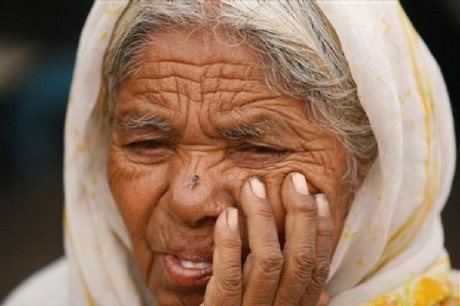
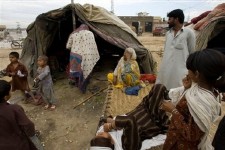
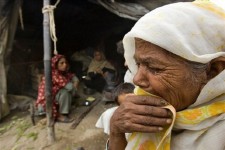
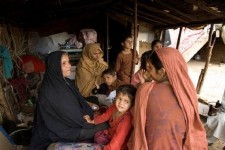
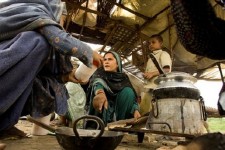



















































I feel sorry for one person…myself…as a student, I am TOTALLY reliant on the CHARITY/DONATION of my parents, and I have NO CLUE about my future after my studies are done.
You see, care about only yourself and family. Everybody has their fate and destiny, stop being emotional.
Dear Adil you have started such a topic which is perhaps too deep for this forum. Ghalib the great had clinched this matter a century ago by saying:
“Lataafat bekasaafat jalwa peida kar nahein sakti
Chaman zangaar he aainaae baade bahaari ka”
What is ‘lataafat’ or ‘kasaafat’ is a matter of ones conception and perception. I, for one, envy the ‘Ode’ culture, to which you are apparently alluding in your above article, wherein the men enjoy and the women serve all day long and at night too quite dutifully without any grudge. Whereas in our middle-class, so called Islamic culture, the woman is not obliged legally, at least to do anything.
If these pictures were not taken this issue would not have been highlighted.
As they say,”Out of sight, out of mind”.
Do we ever get ‘fursat’ from talking politics? on this or any other site to discuss these social issues. How should we tell people sitting thousands of miles away how people are suffering, in this age of print media & TV, words alone are not enough.
I have said my piece, so Good Night all.
@Tina,
I did mention that the charity does not mean stop-gap measures, giving food, money etc.
There are job training, placement & other services offered by NGOs in this country that enhance a person’s skills and give him a helping hand.
I did give Mr Edhi’s example, because despite all the odds and the obstacles (by the bureaucracy) he might have faced, he was able to establish, with the help of lot of people, a reliable public service organization, namely Edhi Foundation. If he can do that, maybe some one here can start something as well, as a result of this post.
Another good example would be the Nobel Prize winner from Bangladesh, who started the micro-credit revolution, by trying to help the poorest of the poor. Details are on the net for all to see.
@ Bilal,
The point of the post and the comments is to raise awareness, and then maybe just maybe prod some one into taking that last step towards actually doing something.
Charity, while well meant, never changes anything and only prolongs the problem.
The poor in Pakistan do not need charity. They need justice, law and order, a reliable infrastructure, and well-funded public institutions, including some kind of social net.
But no, most of the rich Pakistanis will go on talking about Zakat just like conservative Christians in U.S. will give tithes as a good deed while voting to curtail public services.
Why can’t people learn anything?
Of course the situation in Pakistan is slightly different: in the U.S. the wealthy are busy dismantling a national social structure that is already there. The wealthy in Pakistan, OTOH, will never allow a government to come into being in the first place that would redistribute their income in order to fund a functioning state. It’s unthinkable.
And the poor have no wherewithal to fund such a state, and foreign governments will not do it without requiring Pakistan’s sovereignity as the price. It’s a bad situation, no doubt.